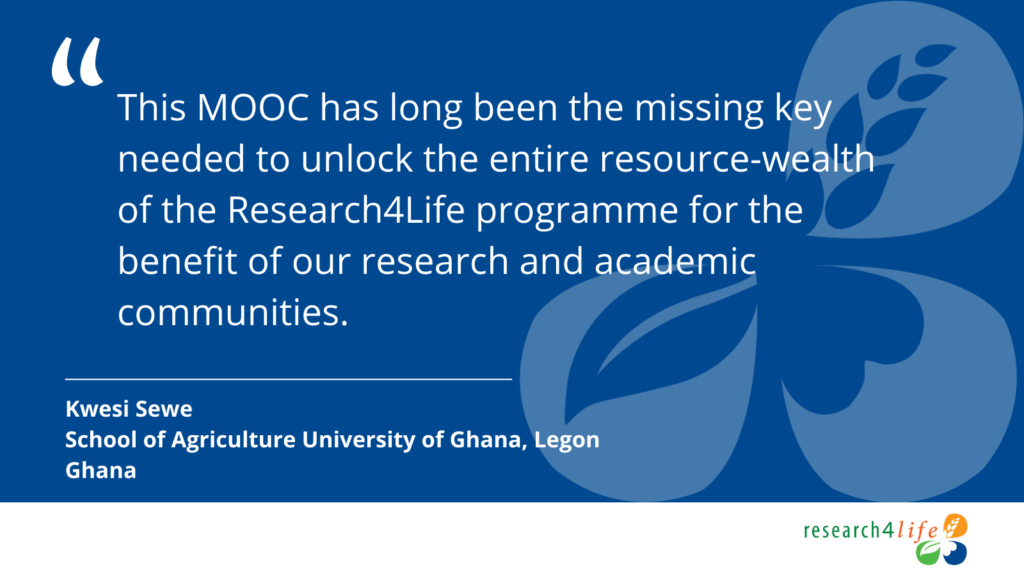Calling registrations for the 7th Research4Life MOOC
Registrations are open for the 7th edition of the Research4Life MOOC. This free five-week course will take place 11th April until 15th May. Register before 30th March 2022 to secure your place!
The course is taught in English. Participants will learn all about using Research4Life and its five collections: Hinari, AGORA, OARE, ARDI and GOALI.
- Immerse yourself in the science communication landscape
- Learn about scholarly literature and how you can use it
- Get tips on finding resources relevant to your discipline
- Understand how to distribute your research results
- Learn how to successfully market your library within your institution and region

Who should apply?
The target audience for this MOOC is aligned with Research4Life’s eligibility criteria. Eligible institutions include: national universities, professional schools (in medicine, agriculture, pharmacy, public health, socio-legal studies, engineering, etc.), research institutes, teaching hospitals and healthcare centres, government offices, national libraries, agricultural extension centers and local non-governmental organizations.
The Research4Life MOOC was developed for librarians, information professionals, IT specialists, researchers, academics, lecturers, educators, students including graduates and post graduates, and professionals, such as doctors, policy makers, extensionists, lawyers, social workers and statisticians in the eligible countries and institutions.
How much time does it take?
Participants are expected to spend on average six to eight hours per week on lessons and activities, such as contributing to discussion forums and webinars.
What do you get from this course?
The MOOC allows participants to study their area of interest throughout a five-week period. The course covers topics such as the scholarly communication landscape, information literacy skills, advocacy and capacity development strategies. Additionally, it provides specific information about using the Research4Life Unified Content Portal and the discipline specific (Hinari, AGORA, OARE, ARDI and GOALI) collections.
Participants of the course will be provided with a Certificate of Attendance after completing the exam at the end of the course. Those who pass the exam with a grade of at least 7.0, will receive a Certificate of Achievement.
Course content
Module 1: Scholarly communication and Research4Life: overview on scholarly communication, the publishing landscape, key concepts about Research4Life including the details about the partnership, programmes, eligibility criteria and registration. Lessons included in this module are:
- Lesson 1.1: Scientific landscape
- Lesson 1.2: Research assessment and bibliometrics
- Lesson 1.3: Research4Life
Module 2: Discovery and re-use of scholarly literature explains key concepts of information literacy skills and competencies, including academic ethics, licensing and academic collaboration tools. Lessons included in this module are:
- Lesson 2.1: Identifying information sources
- Lesson 2.2: Using information resources
- Lesson 2.3: Copyright, licensing and ethical considerations
- Lesson 2.4: Citing, reference management and collaboration tools
Module 3: Collection-specific browsing and searching discusses the Research4Life Unified Content Portal and the five Research4Life collections, including how to conduct discipline-specific searches, an introduction to Summon to search across all Research4Life resources and the bibliometric analysis tools Scopus, the Lens and Dimensions, which are available through Research4Life. Lessons included in this module are:
- Lesson 3.1: Research4Life Unified Content Portal
- Lesson 3.2: Search across Research4Life collections
- Lesson 3.3: Research assessment tools
Module 4: Additional discipline-specific resources in the five main disciplines of the Research4Life collections. Lessons included in this module are:
- Lesson 4.1: Health sciences
- Lesson 4.1.2: Evidence-based medicine
- Lesson 4.2: Agriculture, forestry, fisheries, climate, food security, related biological and environmental sciences
- Lesson 4.3: Environment
- Lesson 4.4. Development and innovation
- Lesson 4.5. Global justice
- Lesson 4.6. Interdisciplinary resources
Module 5: Dimensions of research output discusses how to disseminate research output, prepare a manuscript for publication, identify the appropriate journal, understand the scholarly publishing and peer review processes and how to promote and monitor your research. Lessons included are:
- Lesson 5.1. Writing for research
- Lesson 5.2. Publishing a research article
Module 6: Advocate on Research4Life and facilitate capacity development teaches you how to design advocacy strategies to address decision-makers and upper management. It also guides you on how to train local groups on how to use Research4Life. Lessons included in this module are:
- Lesson 6.1: Research4Life Advocacy Toolkit
- Lesson 6.2: Training Your Audience on How to Use Research4Life
Certification
At the end of the course, participants do a graded online exam. There are two types of certification for this course:
- Certificate of Attendance: for those who complete and submit the exam at the end of the course
- Certificate of Achievement: for those who complete the exam with 7.0 and higher mark.





